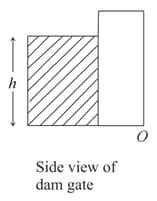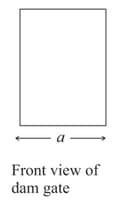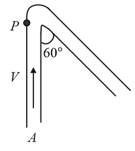Embibe Experts Solutions for Chapter: Fluid Mechanics, Exercise 1: Exercise 1
Embibe Experts Physics Solutions for Exercise - Embibe Experts Solutions for Chapter: Fluid Mechanics, Exercise 1: Exercise 1
Attempt the practice questions on Chapter 13: Fluid Mechanics, Exercise 1: Exercise 1 with hints and solutions to strengthen your understanding. Physics Crash Course KCET (UG) solutions are prepared by Experienced Embibe Experts.
Questions from Embibe Experts Solutions for Chapter: Fluid Mechanics, Exercise 1: Exercise 1 with Hints & Solutions
Water stands upto height behind the dam as shown in the figure. The front view of the dam gate is also shown in the adjoining figure. Density of water is and acceleration due to gravity is . If atmospheric pressure force is also considered, the point of application of total force acting on the dam due to water above is_____


A vessel contains oil (density ) over mercury (density ). A homogeneous sphere floats with half of its volume immersed in mercury and the other half in oil. The density of the material of the sphere (in ) is
A piece of ice is tied using a string to the bottom of bucket . The bucket is filled with water with ice completely submerged in it. Another bucket is filled with water and a piece of ice is released in water. It floats on the surface of water (see figure). What would be the impact on the level of water in the two buckets, when ice pieces melt away completely?

A raft of wood of mass floats in water. The weight that can be put on the raft to make it just sink should be
A block of silver of mass hanging from a string is immersed in a liquid of relative density . If relative density of silver is then tension in the string will be: [ take ]
A bubble of radius in water of density is expanding uniformly at speed . Given that water is incompressible, the kinetic energy of water being pushed is,
Water (density ) is flowing through the uniform tube of cross-sectional area with a constant speed as shown in the figure. The magnitude of force exerted by the water on the curved corner of the tube is (neglect viscous forces)

Bernoulli's theorem is based on the principle of conservation of
